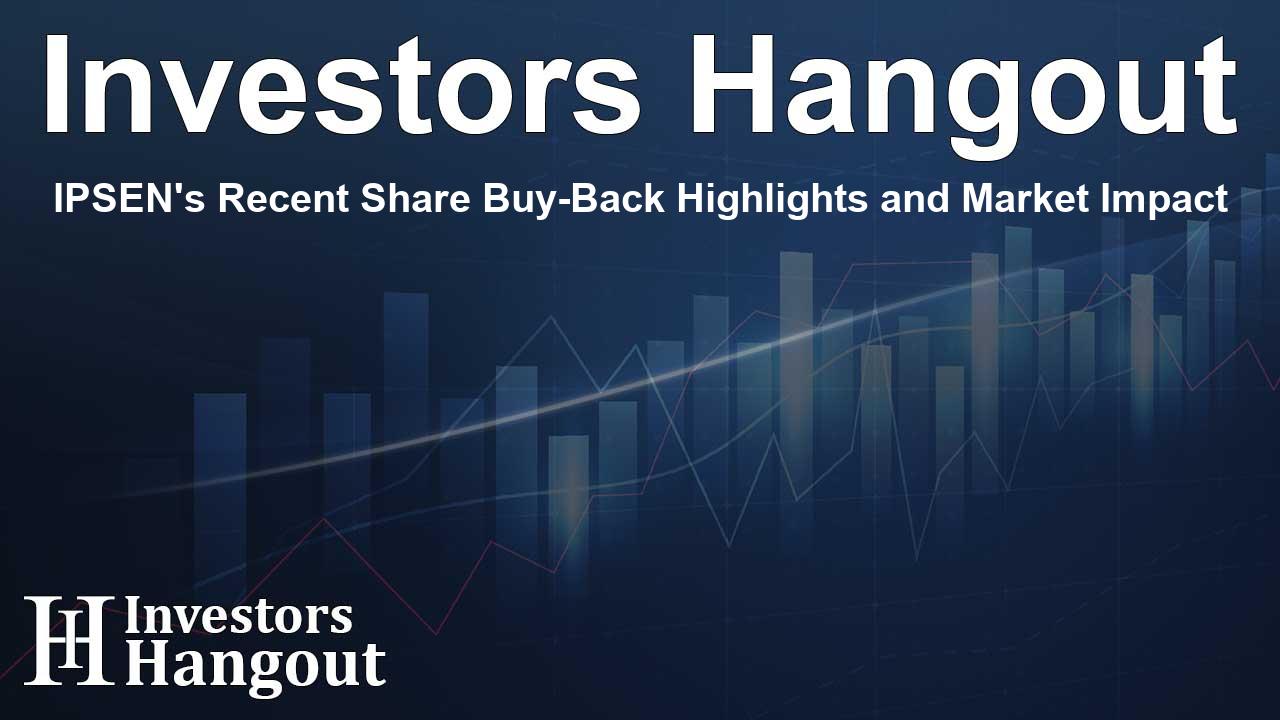IPSEN's Recent Share Buy-Back Highlights and Market Impact

Understanding IPSEN's Share Buy-Back Program
The recent share buy-back program by IPSEN represents a strategic move in financial management. By repurchasing shares from the market, IPSEN aims to enhance shareholder value and positively impact its stock performance.
Transaction Summary from Late July to Early August
This segment provides an overview of IPSEN's transactions involving its own shares. During the first week of August, the following transactions were recorded:
Transactions on July 28, 2025
On July 28, IPSEN repurchased a total of 3,765 shares. The shares were traded at an average price of €113.42 on the market indicated as CCXE.
Transactions on July 29, 2025
Continuing on July 29, the company bought back 2,875 shares at an average price of €111.87, further consolidating its commitment to the buy-back strategy through CCXE.
Further Transactions to End July 2025
IPSEN didn’t stop there; as the week progressed, another batch of shares was repurchased on the same day, totaling 1,893 shares at a price of €112.15. The trades on the market XPAR confirmed the pace in which IPSEN is moving to effectively reduce the share count.
August Buy-Back Continuation
As they moved into August, IPSEN maintained momentum with a purchase of 3,000 shares on August 1 at an average of €102.71. Ongoing buy-backs such as this reflect a robust intent to not only stabilize but potentially raise the values of its shares.
Overall Transaction Impact
In summary, IPSEN’s buy-back program totaled 33,562 shares over the specified period. The average purchase price across transactions hovered around €107.50, illustrating strategic purchasing in the market. This trend suggests a solid commitment by IPSEN to its shareholders, aiming for a healthier financial outlook.
Why Share Buy-Backs Matter
Buy-back programs like those initiated by IPSEN serve multiple purposes. They can boost the earnings per share by reducing the total number of shares outstanding. This often leads to an increase in the stock’s market value and sends a strong signal to investors about the company’s confidence in its own future profitability.
Frequently Asked Questions
What is a share buy-back program?
A share buy-back program is when a company purchases its own shares from the marketplace, reducing the number of outstanding shares, which can lead to increased shareholder value.
How does buying back shares affect stock prices?
Buying back shares generally creates upward pressure on the stock price due to reduced supply, signaling confidence and financial stability to investors.
Does IPSEN have plans for more buy-backs in the future?
While specific future plans are not disclosed, the ongoing buy-back activity indicates that IPSEN values this strategy for enhancing shareholder returns.
What market does IPSEN primarily trade in?
IPSEN primarily trades on the Paris Stock Exchange, with their stock identified by the ticker IPN.
Are share buy-backs a common practice?
Yes, many companies engage in share buy-backs, particularly those with strong cash flows, as a way to return capital to shareholders while potentially increasing the stock price.
About The Author
Contact Olivia Taylor privately here. Or send an email with ATTN: Olivia Taylor as the subject to contact@investorshangout.com.
About Investors Hangout
Investors Hangout is a leading online stock forum for financial discussion and learning, offering a wide range of free tools and resources. It draws in traders of all levels, who exchange market knowledge, investigate trading tactics, and keep an eye on industry developments in real time. Featuring financial articles, stock message boards, quotes, charts, company profiles, and live news updates. Through cooperative learning and a wealth of informational resources, it helps users from novices creating their first portfolios to experts honing their techniques. Join Investors Hangout today: https://investorshangout.com/
The content of this article is based on factual, publicly available information and does not represent legal, financial, or investment advice. Investors Hangout does not offer financial advice, and the author is not a licensed financial advisor. Consult a qualified advisor before making any financial or investment decisions based on this article. This article should not be considered advice to purchase, sell, or hold any securities or other investments. If any of the material provided here is inaccurate, please contact us for corrections.
